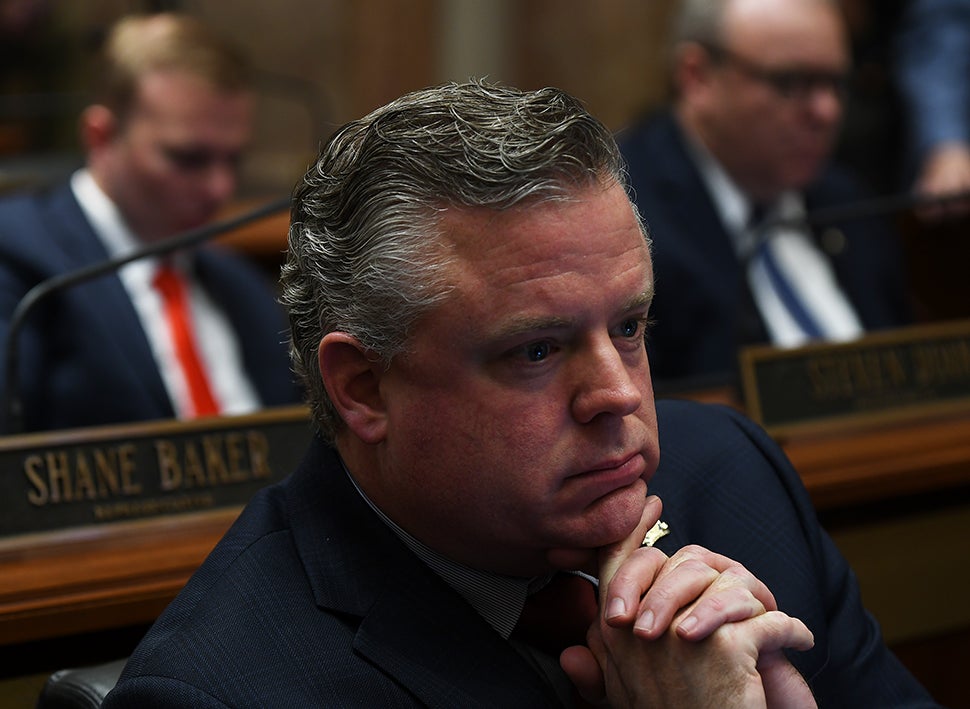‘Zero tolerance:’ House passes bill raising penalties for sex crimes involving minors
Published 4:46 pm Monday, February 26, 2024

- FRANKFORT, Feb. 22 – Rep. Matt Lockett, R-Nicholasville, listens to the floor debate on House Bill 367, an act related to public benefits, Thursday on the House floor. (LRC Public Information)
According to recent CDC data, one in four girls and one in six boys will be sexually abused before they turn 18.
An estimated 325,000 children become victims of child sex trafficking each year, and 14.7% of girls and 6% of boys aged 14 to 17 have been sexually assaulted, many by a known adult.
“Those numbers are frightening,” said Rep. Matt Lockett, R-Nicholasville, “And it’s time that we do our part to severely punish those that would do harm to our children.”
Lockett is the sponsor of House Bill 278, which enhances penalties for a variety of sex crimes involving minors.
What does HB278 do?
First, Lockett’s bill would add childhood sexual assault to a common law enforcement reporting form.
Second, it would prohibit superintendents from employing anyone who has been convicted of a sex crime or is a registered sex offender or convicted violent offender.
Third, it would eliminate the statute of limitations on childhood sexual assault and abuse. Current law gives victims ten years from the time the offense occurred or their 18th birthday.
However, Lockett said data shows that most adults don’t report abuse until close to age 40, significantly after the current 28-year-old ceiling.
Fourth, the bill would increase the felony charge for second degree rape and sodomy from Class C to Class B if the offender is a person in a position of authority or “special trust.”
According to Kentucky law, this includes priests, teachers, parents, guardians, coaches, counselors, youth leaders and other adult figures.
Fifth, it would increase the felony charge for solicitation of a minor using electronic means like computers and cell phones to a Class B felony if the minor is under 12, the offender is in a position of authority or if the minor was procured through human trafficking.
Sixth, human trafficking would be raised to a Class B felony, and if the victim is a minor, a Class A felony—the maximum charge available. Promoting human trafficking would become a Class C felony, and if a minor was involved, Class B.
Finally, the bill would enhance penalties for the distribution of child pornography. Current law’s reduced sentence for a first offense would be removed.
If the victim was under 12, the offense would be a Class B felony, and anyone convicted would have to serve 85% of their sentence before becoming eligible for probation or parole.
“My goal is to have zero tolerance for child sexual assault, sexual abuse, child pornography and human trafficking,” Lockett said.
Several weeks ago, a few members of the judiciary committee expressed concerns over the punishment two minors would face if they violated the child pornography provision.
“I just think sometimes it’s important to consider the age of these participants when you really don’t have grown adults being involved in this, and it’s not being used for commercial purposes,” said Rep. Patrick Flannery, R-Olive Hill.
Matt Hedden, director of special victims unit at the Department of Criminal Investigations, responded that most of the people who distribute child pornography are adults, not kids “sexting.”
“Ultimately it would be up to law enforcement as well as the prosecutor to investigate those crimes that involve those 17 year olds and make that determination about if this was a repetitive conduct between these two kids,” Hedden said.
Monday, House Bill 278 passed unanimously in a 92-0 vote. It heads to the Senate next.





